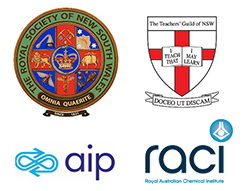Royal Society of NSW News & Events
Frontiers of Science Forum
 “ Exploring major discoveries and theories in physics, mathematics, biology and chemistry ”
“ Exploring major discoveries and theories in physics, mathematics, biology and chemistry ”
Professor Ben Eggleton, University of Sydney
Professor Mary Myerscough, University of Sydney
Julianna Kadar, Macquarie University
Professor Richard Payne, University of Sydney
A joint meeting the Australian Institute of Physics, the AIP, RACI, RSNSW Royal Australian Chemical Institute, the Royal Society of NSW, and the Teachers’s Guild of NSW
Date: Friday, 6 March 2020, 5.15pm for 6.00pm
Venue: Boston University Sydney Campus. 15–25 Regent Street, Chippendale
Ever since the Copernican revolution in the 16th century, science has been progressing at an exponential rate. Major discoveries and theories in physics, mathematics, biology and chemistry have shaped our existence and civilisation, and continue to grow exponentially. The Frontiers of Science forum will present four international experts who will speak on current and upcoming developments in their fields.
New frontiers in photonics—the science of light
Professor Ben Eggleton, School of Physics and Nano Institute, University of Sydney
The mathematics of health honey bee hives
Professor Mary Myerscough, School of Mathematics and Statistics, University of Sydney
Fitbits for sharks: combining biology and data science
Ms Julianna Kadar, Department of Biological Sciences, Macquarie University
Drug discovery inspired by natural products
Professor Richard Payne, School of Chemistry, University of Sydney
Ben Eggleton is a Professor of Physics at the University of Sydney and Director of the University of Sydney Nano Institute. His research deals with photonics at the nanoscale and his group is famous for developing a photonic chip that manipulates light waves at the nanoscale for applications in communications, defence and sensing. Ben is a Fellow of the Australian Academy of Science, the Academy of Technological Sciences and Engineering, the Optical Society of America and the IEEE, and serves as the Editor-in-Chief of APL Photonics.
Mary Myerscough received her first degrees in Applied Mathematics from the University of Sydney and completed her doctorate at the Centre for Mathematical Biology at Oxford University. She returned to Sydney to take up a research position in the School of Chemistry at Macquarie University where she studied the mathematics of combustion. She became interested in honey bees when her boss dropped a paper on her desk which suggested that the temperature of a stationary honey bee swarm could be modelled in a similar way to a smouldering lump of coal. Mary has worked on problems in social insect behaviour in collaboration with biological scientists at Sydney University, Macquarie University and CSIRO. She also undertakes research into models for atherosclerotic plaque development. Mary is Professor of Mathematical Biology and the ssociate Head of School (Education) in the School of Mathematics and Statistics at the University of Sydney.
Julianna Kadar is a PhD Candidate at Macquarie University in the Behaviour, Ecology and Evolution of Fishes Laboratory. She completed her undergraduate degree at Boston University, a Master of Science in Biodiversity Conservation and a Master of Research in Biology before commencing a PhD in 2017. Julianna participates in many education and outreach activities to spread awareness to students and the public about ocean health, sustainability and the scientific process. She is a researcher with CSIRO STEM Professionals in Schools, manages marketing and sales for TEDx Macquarie University, and teaches a STEM in Australia course for Boston University engineering students studying abroad in Sydney. She is also a member of the Homeward Bound Program which is working to build and upskill a network of 1,000 women in STEMM over ten years, and will be traveling to Antarctica in 2020 as part of this exciting program.
Richard Payne was born and raised in Christchurch, New Zealand. He graduated in Science, with first class honours, from the University of Canterbury, New Zealand, in 2002. In 2003, he was awarded a Gates Scholarship to undertake his PhD at the Department of Chemistry, University of Cambridge under the supervision of Professor Chris Abell. After his PhD, Richard moved to The Scripps Research Institute under the auspices of a Lindemann Postdoctoral Fellowship where he worked in the laboratory of Professor Chi-Huey Wong. In 2008, he was recruited to the University of Sydney as a Lecturer of Organic Chemistry within the School of Chemistry. He was promoted to Senior Lecturer in 2011, Associate Professor in 2013, and since 2015 has held the position as Professor of Organic Chemistry and Chemical Biology. Professor Payne’s research focuses on the design and synthesis of complex biomolecules with a view to addressing important problems in biology and medicine. His lab is recognised for pioneering a number of technologies for the assembly of large polypeptides and proteins by chemical synthesis. These methods have underpinned the discovery of modified peptide and protein drug leads (including anti-inflammatories, anti-thrombotics and anti-infectives) for a range of diseases.

